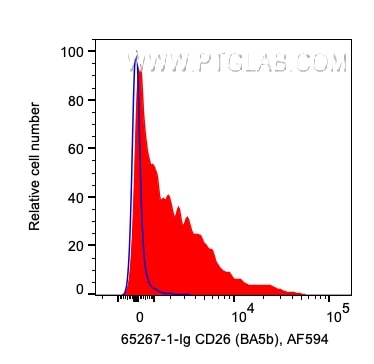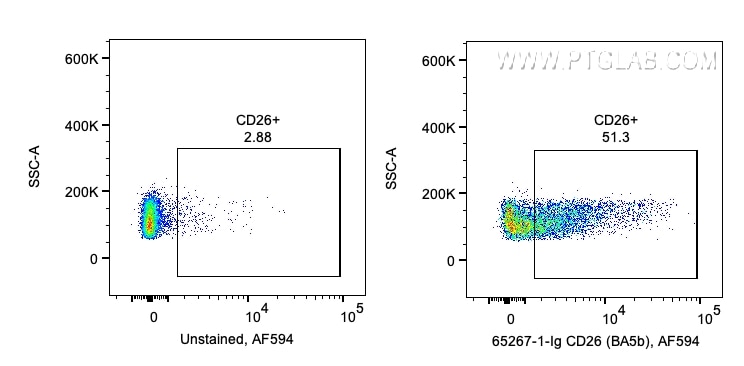Anticorps Monoclonal anti-CD26
CD26 Monoclonal Antibody for FC
Hôte / Isotype
Mouse / IgG2a, kappa
Réactivité testée
Humain
Applications
FC
Conjugaison
Non conjugué
CloneNo.
BA5b
N° de cat : 65267-1-Ig
Synonymes
Galerie de données de validation
Applications testées
| Résultats positifs en cytométrie | CMSP humaines, |
Dilution recommandée
| Application | Dilution |
|---|---|
| This reagent has been tested for flow cytometric analysis. It is recommended that this reagent should be titrated in each testing system to obtain optimal results. | |
| Sample-dependent, check data in validation data gallery | |
Informations sur le produit
65267-1-Ig cible CD26 dans les applications de FC et montre une réactivité avec des échantillons Humain
| Réactivité | Humain |
| Hôte / Isotype | Mouse / IgG2a, kappa |
| Clonalité | Monoclonal |
| Type | Anticorps |
| Immunogène | A human T cell clone |
| Nom complet | dipeptidyl-peptidase 4 |
| Masse moléculaire calculée | 88 kDa |
| Numéro d’acquisition GenBank | BC013329 |
| Symbole du gène | DPP4 |
| Identification du gène (NCBI) | 1803 |
| Conjugaison | Non conjugué |
| Forme | Liquide |
| Méthode de purification | Purification par affinité |
| Tampon de stockage | PBS with 0.09% sodium azide. |
| Conditions de stockage | Store at 2-8°C. Stable for one year after shipment. |
Informations générales
CD26, also known as DPP4 (dipeptidyl peptidase-4), is a 110 kDa type II cell-surface glycoprotein widely expressed on T cells, activated B cells, activated NK cells and myeloid cells as well as on epithelial cells, fibroblasts, mesothelium, and endothelial cells of a variety of tissues (PMID:33777580; 26919392). It has ecto-enzyme activity in its extracellular domain and cleaves amino-terminal dipeptides with either L-proline or L-alanine at the penultimate position (PMID: 9553764). CD26 plays roles in diverse biological processes such as immunoregulation, glucose homeostasis, and tumorigenesis (PMID: 33777580).
Protocole
| Product Specific Protocols | |
|---|---|
| FC protocol for CD26 antibody 65267-1-Ig | Download protocol |
| Standard Protocols | |
|---|---|
| Click here to view our Standard Protocols |



